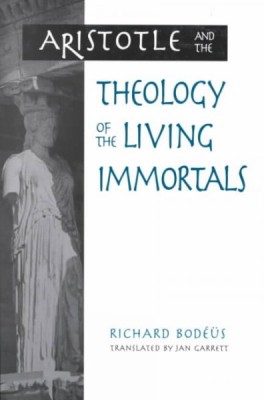| Aristotle and the Theology of the Living Immortals Contributor(s): Bodeus, Richard (Author), Garrett, Jan (Translator) |
|
 |
ISBN: 0791447286 ISBN-13: 9780791447284 Publisher: State University of New York Press OUR PRICE: $35.10 Product Type: Paperback - Other Formats Published: September 2000 Annotation: This book argues that Aristotle used "the most traditional Greek ideas about the gods" to develop and defend his physical, metaphysical, and ethical teachings. This revolutionary thesis stands in stark contrast to studies of Aristotle's texts that normally portray him as a "natural theologian" using rational tools to elaborate his own conception of God or the gods. Bodeus argues that Aristotle is more closely aligned with popular Greek religion than is usually thought, and attention to the ethical and political writings reveals more about Aristotle's resources for conceiving the gods than study of his theoretical works. |
| Additional Information |
| BISAC Categories: - Religion | Antiquities & Archaeology - Religion | Christianity - History - Philosophy | Religious |
| Dewey: 292.209 |
| LCCN: 00020221 |
| Series: Suny Ancient Greek Philosophy |
| Physical Information: 0.85" H x 5.91" W x 8.95" (1.14 lbs) 375 pages |
| Themes: - Theometrics - Academic |
| Descriptions, Reviews, Etc. |
| Publisher Description: This book argues that Aristotle used the most traditional Greek ideas about the gods to develop and defend his physical, metaphysical, and ethical teachings. This revolutionary thesis stands in stark contrast to studies of Aristotle's texts that normally portray him as a natural theologian using rational tools to elaborate his own conception of God or the gods. Bodeus argues that Aristotle is more closely aligned with popular Greek religion than is usually thought, and attention to the ethical and political writings reveals more about Aristotle's resources for conceiving the gods than study of his theoretical works. For Bodeus, Aristotle was a refined polytheist who held that the gods were living immortals and that one could attribute to them wisdom, goodness, and benevolent concern for human beings. The author's approach is at odds with the dominant interpretation, which holds that Aristotle's unmoved mover presents his true view of God. This leads to the argument that the philosopher's apparent endorsements of popular religious ideas should be taken seriously and that his inquiries about the unmoved mover belong strictly to theoretical philosophy, which is unable to study the gods. From this novel perspective, many of Aristotle's texts appear in a new light. |